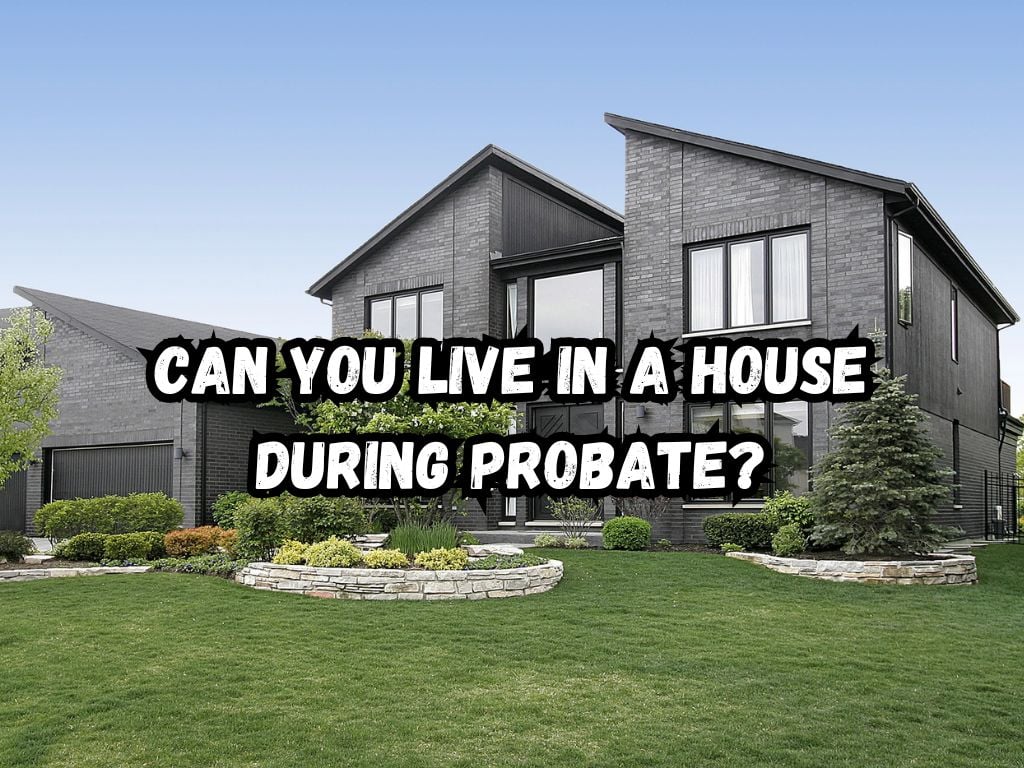Navigating through the probate process after a loved one’s death brings forth many questions, one of the most common being about the possibility of residing in the decedent’s house.
The scenario might appear straightforward at first glance, but the intersection of probate law and everyday practicality often results in a complex situation. So, can you live in a house during probate?
In this article, we dive into the rules, responsibilities, and considerations faced when living in a house during probate.
Understanding Probate
Probate is assumed to be dense with legal jargon, an experience both arcane and inaccessible. Simply put, probate is the process through which a deceased person’s estate is properly distributed.
The process ensures debts are settled and assets are transferred under the supervision of the court. Probate can extend from a few months to a couple of years, largely dependent on the particulars of the estate and the speed of the legal system.

Can You Live in a House During Probate?
Stepping into a house tangled in probate is not without its web of legal threads. Such houses are largely controlled by the estate’s executor who carries the weight of decision-making.
Legal and ethical obligations require them to manage the estate in the best interests of all beneficiaries.
Before one decides to stay in a house during probate, it is vital to understand who has the lawful right to do so. Typically, until the probate court reaches a decision, use of the property remains restricted.
Living in a House During Probate: Who’s Allowed?
It’s a nuanced question who can dwell within the walls of a probate home. If a beneficiary or heir is already living in the home at the time of the owner’s death, they may usually continue to do so.
However, staying in the home without previous consent or a clear mandate from the will can lead to legal troubles.
This is an area rife with intricacies, where the interplay between the deceased’s final wishes and state law comes into full force.
Tenants who rented from the deceased can normally remain until their lease expires, unless otherwise handled through the probate process.
Financial Responsibilities and Expenses
Money remains the linchpin in many of life’s endeavors and probate is no stranger to it. Even while in probate, the house incurs usual expenses such as mortgage payments, utility bills, and property taxes.
Often, these payments are taken care of from the estate’s funds. However, if you reside in the house during probate, you may be responsible for some of these costs, either partially or totally.
Regardless, it is crucial to keep a precise account of all the payments made. Such financial vigilance ensures transparency and aids in the ultimate settlement of the estate.
Maintaining the Property Throughout Probate
Indeed, a house in probate is not a passive entity. It requires ongoing care and attention. Abandoning maintenance can lead to the decay of the property’s value, which might spark disputes among beneficiaries.
Those living in the house—whether they are heirs or not—must keep the property in good condition, ensuring no loss to the estate.
Pro Tips: Steps to Take if Living in a Probate House
Should you find yourself living in a probate house, requesting approval from the executor remains a priority. Known responsibilities should be spelled out in an agreement when possible.
Financial preparation is also key for the likelihood of having to vacate, particularly when the time comes for asset distribution or the property’s sale.
As with many legal processes, complications are not a rarity but an expectation. Tensions over asset management may rise among beneficiaries.
A house in probate might also see an array of claims from creditors or face a court-order for sale to satisfy debts.
In such instances, clear communication and a solid understanding of your rights and duties as an occupant can help smooth out the wrinkles. Staying informed and seeking legal advice when necessary can prevent mishaps.

Frequently Asked Questions
Is it legal to live in a house during the probate process?
Yes, it’s usually legal to live in a house during probate if you are an heir or beneficiary and have been living there prior to the owner’s death. However, permission from the executor and the court might be needed, especially if you move in after the owner’s death.
Who is responsible for paying the mortgage on a house in probate?
The estate generally pays the mortgage and other associated costs. If someone lives in the home during probate, they may agree to pay the expenses or a portion thereof.
Can you rent out a house that is in probate?
Renting out a property in probate is possible but requires the executor’s approval and sometimes the court’s. Rental income typically benefits the estate and is used to cover ongoing expenses.
What happens if you live in a probate house without permission?
Living in a probate house without permission can lead to legal complications, including eviction or legal action from the executor, beneficiaries, or the court, and might disrupt the probate process.
Conclusion
One can indeed live in a house during probate, but navigating this path requires a good grasp of legal matters and a robust line of communication with the executor. It is a period marked by patience and prudence.
Living in a house as it goes through probate is both a privilege and a responsibility. While the law may vary from state to state, the universal truth remains — to manage the estate promptly and respectfully, honoring the legacy of the deceased and maintaining the peace among those left in the wake of their passing.


 Tags:
Tags:










